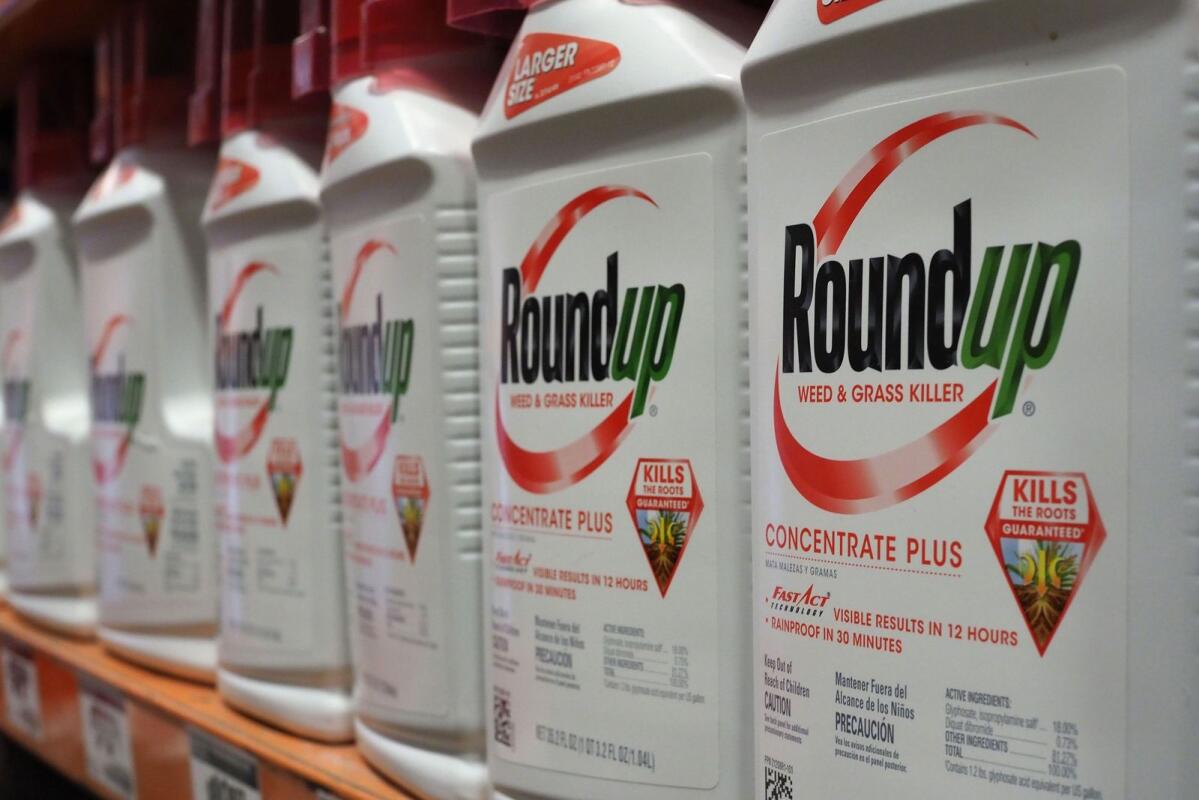Iowa Senate lawmakers advanced, for the second time, a bill that would protect chemical manufacturers from lawsuits over failure to warn consumers about potential adverse health effects.
The bill, Senate Study Bill 3188, was supported by Bayer, the manufacturer of the glyphosate-based herbicide Roundup. Bayer has been hit by lawsuits from individuals claiming it failed to warn consumers of the potential health risks of Roundup.
The company has won some lawsuits against individuals alleging Roundup caused their cancer, but in other cases it has been found liable. Bayer spent more than $10 billion settling most pending claims in 2020.
Under the bill, pesticide manufacturers could not be held liable for failing to warn consumers about adverse health effects in a way that exceeds the U.S. Environmental Protection Agency labeling requirements. The bill stipulates that the immunity would not apply to Chinese state-owned companies, singling out the massive agriculture and chemical company Syngenta.
The bill was advanced by the two Republicans on a three-member subcommittee Monday. It is eligible for a hearing in the full Senate Appropriations Committee.
Bayer purchased the Roundup maker Monsanto in 2018. The company has multiple crop science plants in Iowa, including a plant in Muscatine that manufactures Roundup.
Lobbyists for Bayer and major farm groups supported the bill and told lawmakers on Monday it would prevent unfounded lawsuits against the company, which creates a vital tool for farmers.
Brad Epperly, a lobbyist for Bayer, said existing law and EPA regulations prevent Bayer from providing warnings that exceed EPA requirements. He said complying with EPA rules satisfies the company’s duty to warn.
Bayer has said it will seek a U.S. Supreme Court ruling to determine whether state-level duty-to-warn claims are preempted by federal law. A federal appeals court in February decided that those claims can be considered, and allowed a lawsuit to go forward.
“We are not in a position where we can make that kind of warning,” he said. “There’s no regulatory body in the entire world who finds this carcinogenic.”
Glyphosate-based herbicides like Roundup have received significant scrutiny over health claims. The EPA found glyphosate is “not likely” to be carcinogenic and has determined there are no “risks of concern to human health,” but a U.S. appeals court in 2022 vacated those findings for procedural reasons and required the agency to reconsider.
A World Health Organization cancer agency found glyphosate in 2015 to be “probably carcinogenic to humans,” but European Union regulators have found that there was not sufficient evidence for that categorization.
Environmental groups and some individuals objected to the bill, saying it would take away the ability of farmers to seek compensation when a company sells dangerous chemicals without proper warning.
Alicia Vasto, the water program director for the Iowa Environmental Council, said that there have been other chemicals approved by the EPA that were later found to be dangerous.
“This bill would prevent Iowa farmers and rural residents from seeking justice in the future,” Vasto said. “Time and time again, research has uncovered the dangers of pesticide after the EPA has declared a product safe for use.”
A similar bill made it partway through the lawmaking process this year before failing to pass out of either chamber before a deadline. The new bill adds language exempting Chinese-owned companies from immunity.
A lobbyist for Syngenta, which is owned by the Chinese state-owned enterprise ChemChina, called the bill “discriminatory.” Kellie Paschke, representing Iowa trial lawyers, said the provision may be unconstitutional.
Sen. Mark Costello, R-Imogene, who is a farmer, said he’s concerned that if Bayer receives too many punitive court rulings related to Roundup, farmers could lose access to the product. Costello said consumers could still sue the company over specific harms, just not over a duty to warn.
“If they find out they've been lying to us or misrepresenting things, or if it ends up that it really is dangerous, and it's proven, then they can still sue under this statute,” he said.
Sen. Bill Dotzler, a Democrat from Waterloo, declined to advance the bill. He said he thinks there’s evidence that Roundup contributes to instances of non-Hodgkin's lymphoma and other cancers.
“I think the label should say some kind of warning that this could affect your health,” he said.

 www.thegazette.com
www.thegazette.com
The bill, Senate Study Bill 3188, was supported by Bayer, the manufacturer of the glyphosate-based herbicide Roundup. Bayer has been hit by lawsuits from individuals claiming it failed to warn consumers of the potential health risks of Roundup.
The company has won some lawsuits against individuals alleging Roundup caused their cancer, but in other cases it has been found liable. Bayer spent more than $10 billion settling most pending claims in 2020.
Under the bill, pesticide manufacturers could not be held liable for failing to warn consumers about adverse health effects in a way that exceeds the U.S. Environmental Protection Agency labeling requirements. The bill stipulates that the immunity would not apply to Chinese state-owned companies, singling out the massive agriculture and chemical company Syngenta.
The bill was advanced by the two Republicans on a three-member subcommittee Monday. It is eligible for a hearing in the full Senate Appropriations Committee.
Bayer purchased the Roundup maker Monsanto in 2018. The company has multiple crop science plants in Iowa, including a plant in Muscatine that manufactures Roundup.
Lobbyists for Bayer and major farm groups supported the bill and told lawmakers on Monday it would prevent unfounded lawsuits against the company, which creates a vital tool for farmers.
Brad Epperly, a lobbyist for Bayer, said existing law and EPA regulations prevent Bayer from providing warnings that exceed EPA requirements. He said complying with EPA rules satisfies the company’s duty to warn.
Bayer has said it will seek a U.S. Supreme Court ruling to determine whether state-level duty-to-warn claims are preempted by federal law. A federal appeals court in February decided that those claims can be considered, and allowed a lawsuit to go forward.
“We are not in a position where we can make that kind of warning,” he said. “There’s no regulatory body in the entire world who finds this carcinogenic.”
Debate over Roundup health risk
Glyphosate-based herbicides like Roundup have received significant scrutiny over health claims. The EPA found glyphosate is “not likely” to be carcinogenic and has determined there are no “risks of concern to human health,” but a U.S. appeals court in 2022 vacated those findings for procedural reasons and required the agency to reconsider.
A World Health Organization cancer agency found glyphosate in 2015 to be “probably carcinogenic to humans,” but European Union regulators have found that there was not sufficient evidence for that categorization.
Environmental groups and some individuals objected to the bill, saying it would take away the ability of farmers to seek compensation when a company sells dangerous chemicals without proper warning.
Alicia Vasto, the water program director for the Iowa Environmental Council, said that there have been other chemicals approved by the EPA that were later found to be dangerous.
“This bill would prevent Iowa farmers and rural residents from seeking justice in the future,” Vasto said. “Time and time again, research has uncovered the dangers of pesticide after the EPA has declared a product safe for use.”
Bill would exempt Chinese-owned companies
A similar bill made it partway through the lawmaking process this year before failing to pass out of either chamber before a deadline. The new bill adds language exempting Chinese-owned companies from immunity.
A lobbyist for Syngenta, which is owned by the Chinese state-owned enterprise ChemChina, called the bill “discriminatory.” Kellie Paschke, representing Iowa trial lawyers, said the provision may be unconstitutional.
Sen. Mark Costello, R-Imogene, who is a farmer, said he’s concerned that if Bayer receives too many punitive court rulings related to Roundup, farmers could lose access to the product. Costello said consumers could still sue the company over specific harms, just not over a duty to warn.
“If they find out they've been lying to us or misrepresenting things, or if it ends up that it really is dangerous, and it's proven, then they can still sue under this statute,” he said.
Sen. Bill Dotzler, a Democrat from Waterloo, declined to advance the bill. He said he thinks there’s evidence that Roundup contributes to instances of non-Hodgkin's lymphoma and other cancers.
“I think the label should say some kind of warning that this could affect your health,” he said.
Iowa bill would create legal immunity for pesticide manufacturers
Iowa Senate lawmakers advanced, for the second time, a bill that would protect chemical manufacturers from lawsuits over failure to warn consumers about potential adverse health effects. The bill is supported by Bayer, the manufacturer of Roundup.


